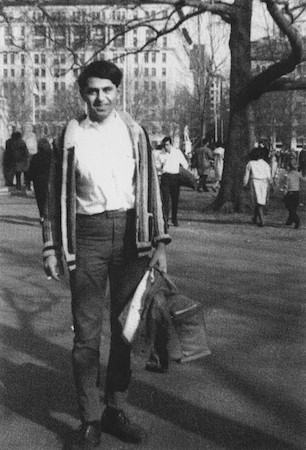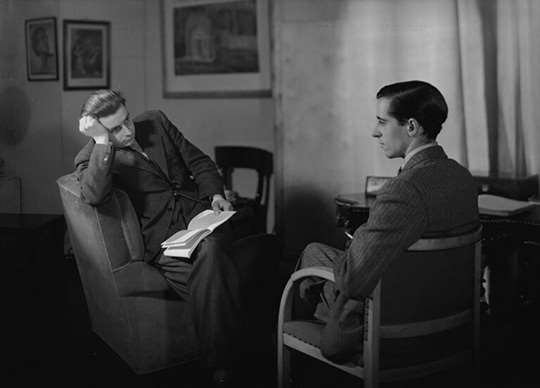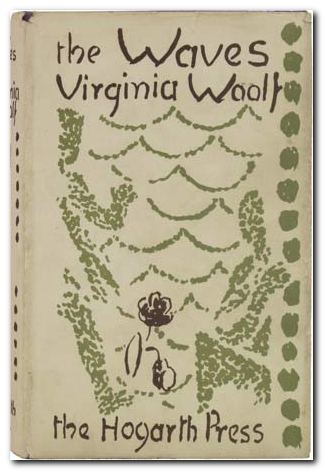
Noise Outside
I'm tired
I'm going to bed.
I'm tired. Look for me.
I will wake up
And kiss me
whether i wake up
or not.
I'm tired.
When the birds stop
I will wake up or not.
The windows are open.
*

Noise Outside
In the Grass


Paris (1979) photograph by Richard Avedon

from The Waves (1931)
‘I see a ring,’ said Bernard, ‘hanging above me. It quivers and hangs in a loop of light.’
‘I see a slab of pale yellow,’ said Susan, ‘spreading away until it meets a purple stripe.’
‘I hear a sound,’ said Rhoda, ‘cheep, chirp; cheep chirp; going up and down.’
‘I see a globe,’ said Neville, ‘hanging down in a drop against the enormous flanks of some hill.’
‘I see a crimson tassel,’ said Jinny, ‘twisted with gold threads.’
‘I hear something stamping,’ said Louis. ‘A great beast’s foot is chained. It stamps, and stamps, and stamps.’
‘Look at the spider’s web on the corner of the balcony,’ said Bernard. ‘It has beads of water on it, drops of white light.’
‘The leaves are gathered round the window like pointed ears,’ said Susan.
‘A shadow falls on the path,’ said Louis, ‘like an elbow bent.’

o welcome Hector to his death
God sent a rolling thunderclap across the sky
The city and the sea
And momentarily—
The breezes playing with the sunlit dust—
On either slope a silence fell.
Think of a raked sky-wide Venetian blind.
Add the receding traction of its slats
Of its slats of its slats as a hand draws it up.
Hear the Greek army getting to its feet.
Then of a stadium when many boards are raised
And many faces change to one vast face.
So, where there were so many masks,
Now one Greek mask glittered from strip to ridge.
Already swift
Boy Lutie took Prince Hector's nod
And fired his whip that right and left
Signalled to Ilium's wheels to fire their own,
And to the Wall-wide nodding plumes of Trojan infantry—
Flutes!
Flutes!
Screeching above the grave percussion of their feet
Shouting how they will force the savage Greeks
Back up the slope over the ridge, downplain
And slaughter them beside their ships—
Add the reverberation of their hooves: and
'Reach for your oars. . .'
T'lesspiax, his yard at 60°, sending it
Across the radiant air as Ilium swept
Onto the strip
Into the Greeks
Over the venue where
Two hours ago all present prayed for peace.
And carried Greece
Back up the slope that leads
Via its ridge
Onto the windy plain.

An account of books 16-19 of the Iliad by Homer.
Down on your knees, Achilles. Farther down.
Now forward on your hands and put your face into the dirt,
And scrub it to and fro.
Grief has you by the hair with one
And with the forceps of its other hand
Uses your mouth to trowel the dogshit up;
Watches you lift your arms to Heaven; and then
Pounces and screws your nose into the filth.
Gods have plucked drawstrings from your head,
And from the templates of your upper lip
Modelled their bows.
Not now. Not since
Your grieving reaches out and pistol-whips
That envied face, until
Frightened to bear your black, backbreaking agony alone,
You sank, throat back, thrown back, your voice
Thrown out across the sea to reach your Source.

Sounding Chinese at Inspiration Point
Nice spring day off big white cloud
At Inspiration Point escaping time wars
Poet takes book & wine bottle up into Mist Mountains
Since only available agenda is rhyming with silence
Seeking window of opportunity on a wall
I disguise what I have to say by sounding Chinese
Such as stars are now darker and farther away
They take deeper drinks because space is
Drying out afraid to think own thoughts
Administered citizen achieving condition of robot
In public mind things not so good these days
Nor in wrong run will it matter to Tu Fu
After Oppen
‘sensed at
their limitsfrom Birdie Africa
"My father calls me Wolf.
He says that I will see things other people will not see."
*****
"When I come home my father will be singing like an old kind dream. I have seen things at night that other people have not seen."
*****
"Kind Sir: Lost and of your same kind I have turned around twice with my eyes sealed and the woods were white and my night mind saw such strange happenings, untold and unreal."
*****
I am Birdie now I don’t know why.
I squat at the edge of the top
of our rowhouse & I’m without wings I think.
Philadelphia isn’t gentle now. Bad things echo up
& down our neighborhood at night.
I think we wound the people of our street.
I am hurting myself.
I can’t tell time you know.

GOULDIAN KIT
What makes you think I’m an eccentric, he said, in London
To the brood of the reporters who had gathered to report
On his eccentricities – the tin sink light enough for traveling
But deep enough to swallow his exquisite hands in water filled with ice.A budgerigar accompanies, perched atop the fugue of Hindemith.
You are quivering now like the librarian reading
to herself out loud in her Arctic roomComposed entirely of snow.
A broadcast (high fidelity) bound by the quiet of the land and
The Mennonite who told himWe are in this world but not of this world,
You see. From the notebook of your partial list of symptoms, phobias:
Fever, paranoia, polio (subclinical), ankle-foot phenomenon,
The possibility of bluish spots. Everything one does is fearNot being of this world or in this world enough.
There is no world I know, without some word of it. (49)
The poem is largely a catalogue of impressions or ideas that are associated with Glenn Gould. Gould was a noted eccentric, as suggested by the opening; also a noted hypochondriac, which explains the lines near the end. The lines in the middle about snow and a high-fidelity broadcast perhaps contain the hint of a reference to or a reminiscence of his famous documentary, “The Idea of North,” which he created for the CBC. But even if the poet is not referring to that, we can’t really be surprised to find references to snow in a poem about a prominent Canadian; Canada is cold, after all, remember?
Yes, that’s a photo of Glenn himself as a child; and, if you look closely at the top of the music on the piano you will see, perched there, clear as day, a budgerigar – no doubt the very budgerigar in question in “Gouldian Kit.”
What can I say? My hat is off to Lucie Brock-Broido. Whether the music is in fact a fugue of Hindemith is beyond me to say; if Brock-Broido can tell from that photo that it is, then hats off to her again.
A Long Way from Big Pink
We move from Glenn Gould to another Canadian musician:
MOON RIVER
What is it exactly that you mean when you call me
Your “huckleberry friend”?What if soon you, too, will go down
Like a sheepdog who has tasted blood on a gentleman’s farmFar outside the coal belt, and I do not get to see your
Inflorescence one more time what then?Like a lantern-boat half on fire somewhere down
The crazy river of your mind,
Framed by endless strings of small whortleberry lights, ablaze,Still, I go on crossing you in style. My affection has always
had its girdled caveats –
A mushroom-colored cummerbund sashingThe waist of another man, or my feeling formal knowing
When to take the fork out of the toaster, at the very moment ofThe metaled tines contacting the one electric outlet in the barn.
Even though you will not speak to me again, not in this life,
Where fear accompanies you like a yellow buggy or a carnivore
With dark spots and a long-ringed tailUnhitched to anything,
I forgive you – everything.Besides,
You’ve always been such an odd uncanny half-genet of man. (57)
Yes, I am not mistaken – that is a clear reference to the Robbie Robertson song “Somewhere Down the Crazy River.” It’s a long way from Glenn Gould to Robbie Robertson, and we might ask ourselves, what do they have in common? What could have brought these two together in this poetry collection?
It can only be that both are Canadian.
High Fakery as a Poetic Style (Literary-Critical, Unrelated to Canada)
“It was always autumn in the paraphernalia of my laudanums.”
That’s the opening line of the poem “We Have Always Lived In The Castle,” from Stay, Illusion, and if I had to pick a single line to sum up Brock-Broido’s style, I might pick that one. It’s not that the line is obscure; obscurity happens at times in poetry, and it’s our job as readers to try to make what we can of it. And we can try: I know what laudanum is; but what are laudanums? Paraphernalia could be objects used to take the drug (like a junkie’s kit); but how is autumn in these objects? And why autumn? Just for its poetic sheen of a slow sinking into death (one of the concerns of this collection)? For the jingle the “um” ending makes with the end of “laudanum”? And why always? The effects of the laudanum make her feel like it is always autumn? This is a possible interpretation; but if that’s what you mean, there are better ways to say it.
But in trying to make sense of the line, we are following a false path, because in fact this line has been carefully constructed to have no sense. This is not a line that is trying to say something and failing, or that is saying a complex thing in a difficult way; this is a line that is trying very hard not to say anything in a very specific manner – namely, a manner that one might deem “poetic.”
This is the essence of a poetic style that I think of as High Fakery: poetry that is very self-consciously “poetic” in terms of its diction, its use of imagery and metaphor, and the way it seeks out high-sounding obscurity that could be taken for profundity but is generally just an ornate casing for vacuity. Each poem has a well-worked surface of apparent poeticism, but if you fix it with a steady critical gaze, it will crumble to dust and blow away because there is nothing inside it – no meaning, no passion, no vitality to animate the words – the language is dead and embalmed, each poem an exhibit in a silent, sepulchral museum consecrated to the poet’s idea of herself as “a poet.”
I recognize that it is poor form to make generalizations like this without quoting lines to back them up. At the same time, I have quoted four of Brock-Broido’s poems in their entirety already – do I really need to quote more?
As an example of what I’m talking about, scroll back up and re-read the first six or eight lines of “Extreme Wisteria.” You can see, right there, the essence of High Fakery. There is a will to obscurity, an insistent refusal to speak clearly; instead we are given little bursts of words (“wild in ecstasy”), seemingly meaningless metaphors (“attar of herself”), a focus on “colourful” or “unexpected” verbs at the expense of sense (“triaged out”), and moments of (presumably unintentional) hilarity (“Lemurs in parlors, inconsolable”). This is not language being used to convey meaning to the reader; rather, it is language being used to create something more like an atmosphere, a hazy, vague feeling that something “poetic” is going on – a kind of impasto with words.
To be fair, the poem does become clearer as it goes on (beginning at the words “Case history”), and it is quite possible that there is a perfectly comprehensible experience or idea behind “Extreme Wisteria.” Perhaps the dying woman who seems to be the centre of the poem kept lemurs as pets; perhaps she wore rose-petal perfume; but there is no attempt to communicate these ideas clearly. Rather, the poet’s goal seems to be to obscure what she is talking about as much as possible, apparently on the principle that great poetry is always obscure. And that, I think, is the essence of my quarrel with this kind of writing.
Truly great, difficult poetry is always the result of a writer trying to communicate clearly (with perhaps a few exceptions – Lycophron?); the difficult surface is the knotty result of the writer’s struggle to convey a complex idea or emotion. Obscurity such as Brock-Broido’s is the opposite: it is an obscure surface that is applied over the top of an absence, to try to conceal that absence. Great poets write obscurely when they are trying to communicate clearly; bad poets write obscurely when they are trying to cover up the fact that they have nothing to communicate.
This is not poetry written for readers who actually love genuinely good poetry; rather it is written for readers who affect an interest in poetry without really knowing anything about it or having any desire to find out. It’s the sort of thing you can read on your couch in an afternoon without really paying it much attention, and then later, when you go out to a dinner party, you can mention that you read it, and your friends will be impressed that you are “interested in poetry”. It is all about the language on the surface, designed for those who read poetry as if they were bathing in – I was going to say an ocean of incomprehensibility, but it’s really more like a mucky little pond of confusion.
At Last, Some Music (If you read the above, you’ve more than earned it)
Since the specific quality of Gould’s later (1981) recording of the Goldberg Variationsis at issue in “Extreme Wisteria,” this video seems appropriate. It’s a comparison of the opening Aria from his two recordings, as part of a conversation with Tim Page about his approach to the later re-recording:
And here is Gould talking a bit about Hindemith, and then playing the fugue from Hindemith’s Piano Sonata No. 3:
I’m trying to imagine how that would sound with budgerigar accompaniment.
And here, if you can stand it, is the video for “Somewhere Down the Crazy River”:
Although personally, I would recommend seeking out the audio-only version.
A writer living in Toronto, Canada.
Twitter: @thatbrookeclark
from Pansies THE WHITE HORSE The youth walks up to the white horse, to put its halter on and the horse looks at him in silence. They are s...